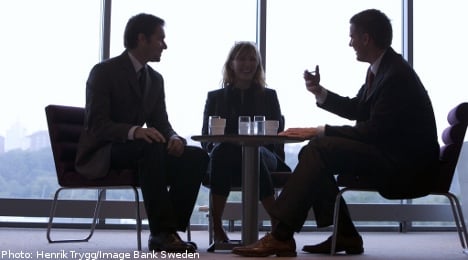A total of 800,000 people own or manage their own businesses in Sweden, according to the Confederation of Swedish Enterprise (Svenskt Näringsliv), and an increasing number of them are women.
In the last decade, the number of women running businesses in Sweden has increased by 36 percent, well above the overall 22 percent increase in people running businesses.
There are now 238,000 women responsible for running businesses in Sweden, according to the study.
In compiling the figures, the confederation included registered sole proprietors, co-owners of trading companies, as well as CEOs and board members in active joint-stock companies.
According to Carolina Brånby, a business climate expert at the Confederation of Swedish Enterprise, reforms carried out by the centre-right Alliance government in recent years go a long way toward explaining recent growth of women-run businesses in Sweden.
“I’m convinced that the government’s policies played a significant role in encouraging more women to start their own businesses,” she told The Local.
Brånby pointed to two reforms in particular – a 2009 law allowing municipalities to open up publicly financed activities – particular health services – to private contractors, as well as changes to tax laws making it less expensive for people to pay for cleaning and other household services.
“The new laws created incentives and opened up new markets for small business owners,” she said.
Previously, Swedish municipalities managed publicly-financed old-age and home care services, effectively shutting out private actors, according to Brånby.
She cites the Act on the System of Choice in the Public Sector (Lagen om valfrihetssystem – LOV), which came into effect in 2009, as a contributing factor to the recent increase in women-run businesses in Sweden.
Following the changes “there was suddenly a new sector available for people who wanted to run their own businesses”, said Brånby.
In addition, Sweden’s household services tax relief (RUT-avdrag), which provides tax breaks that result in households saving up to 50 percent on a range of services including babysitting and cleaning, has also spawned a number of new businesses, many of which are run by women.
Despite the figures from the Confederation of Swedish Enterprise showing a steady increase in women managing businesses, other measures show that Sweden still lags behind many other countries in Europe when it comes to women in business.
Only 3.8 percent of Sweden’s working female population run businesses on a full-time basis, according to figures from Eurostat, while the EU average is 5.5 percent.
“While the figures don’t correspond exactly to ours, it shows that Sweden still has a ways to go in terms of encouraging women entrepreneurs,” said Brånby.



 Please whitelist us to continue reading.
Please whitelist us to continue reading.
Member comments